Rik Photos Credit (Non-Live): Stuart Hendrie
Rik Emmett has 5-decades in the music industry, a dozen platinum records with TRIUMPH, 20-indie records ranging from rock to jazz to classical. He is a singer, songwriter and masterful guitarist. He was a music educator at Humber College in Toronto and had a successful column in Guitar Player magazine for over a decade. With a resume as this, one would think at least some ego would follow. Not the case with Emmett. While he may have been that guy that belted out those nearly impossible vocals and flawless guitar riffs in TRIUMPH, causing many air-guitar performances and out of range vocal attempts by others, talking to him feels like itís a casual conversation with a neighbor. Heís humble, kind and completely unassuming.
I recently interviewed Rik for KNAC.COM. Check out his website for more info and to check out his vast solo catalogs, masterclasses, and streams. http://www.rikemmett.com/
KNAC.COM: Good Morning! How are you?
EMMETT: Iím good. You know, Iíve had a morning full of chit chat and Zoom things. Iím hanging in there. Iím having fun with all of this. Itís been quite an interesting and surreal time of my life for sure. I mean, hereís Round Hill wanting to put up a catalog, (https://roundhillmusic.com/news/triumph-classics-to-be-re-released-as-a-double-lp-on-silver-vinyl), and documentary films are being made about our past. I have new music out on my website. Over the course of the last year or so, I finished a book of poetry, and I gave it to the publisher and now they want to put the book out. So thereís all this stuff thatís going on where Iím going, ďHey, retirement was actually a good career move.Ē [laughs]
KNAC.COM: Thatís awesome. Are you busier now than before retirement?
EMMETT: Yeah, I mean, I donít have to go to the airport anymore. This Zoom thing is kind of fun. Iíve done some workshops the last couple of weekends, and Iím booked for some more. You donít have to go to the airport, check into hotels, all I have to do is go into my office and sit in front of my laptop.
KNAC.COM: You donít even have to wear pants, Rik. Thatís the biggest bonus. Technology has come so far. Even recording. Musicians donít even have to get into a studio anymore, it can be done through file shares. Itís pretty amazing.
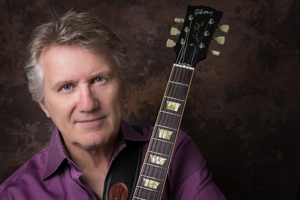 EMMETT: Yeah. I have a studio in my basement. The Bonfire stuff I have on my site to download, Folk Songs For The Farewell Bonfire I just did with a couple of good mics and a computer and away you go.
EMMETT: Yeah. I have a studio in my basement. The Bonfire stuff I have on my site to download, Folk Songs For The Farewell Bonfire I just did with a couple of good mics and a computer and away you go.
KNAC.COM: Thatís right. Thinking about your career, you know, sometimes there are people you meet that have a job for 40 years, retire from that job, have a couple of kids along the way, and their biggest accomplishments can be wrapped up on one hand. Itís not really like that for you, is it? I mean, 5-decades in the music industry with numerous records from rock to jazz to classical, a dozen platinum records with TRIUMPH, a successful column in Guitar Player magazine, married to your love for many of those years...did I miss anything?
EMMETT: Hereís one. When I was in high school and college I was the cartoonist for the school papers and the yearbooks and stuff. When Howard Bloom was TRIUMPHís publicist and when we got signed to RCA in New York, he got me a gig where I did several months of cartoons in Hit Parader magazine. So, I have also been a published cartoonist. [laughs]
KNAC.COM: Wow. Unbelievable.
EMMETT: To me itís not unbelievable. To me itís just standard operating procedure, that Iíll creatively pursue whatever drops in my lap. So Iíve had a lot of experiences that maybe other guys donít have, but I donít know. The other thing is this whole idea of reinvention. Like, I was never sort of a David Bowie kind of character where there was a lot of image and fashion and all of that related to it. On a creative level certainly, I was always feeling like thatís an important thing. You have to keep moving. Maybe itís a bit more like being a chicken, in that if youíre a moving target, youíre harder to hit. I just felt like I was never going to let the marketplace be the thing that dictated what I was going to do next. I was going to wait and see what the muse was calling to me and saying, ďThis is where you should go.Ē I was always being led by what I was writing in my notebooks or what was coming out of me when I was sitting there with my guitar. Sometimes you have to fight the powers that be, like radio is not going to necessarily add you into their demographic. Record companies are going to go, ďWhat are you doing?Ē You canít shoot yourself in the foot here. You have this expectation in the marketplace. Screwing with expectations has always been a part of who I am. [Laughs]. Itís a modest thing. Itís a humble thing. Itís not necessarily an ego thing as much as itís, ĎI canít really help myself, this is who I really amí.
KNAC.COM: Do you think thatís more for creative types? Again, going back to some people being content having that one job for 40 years and retiring with taking cruises and not really tapping into their potential creative side.
EMMETT: Yeah, you know, Iím going to agree with you and disagree with you. I mean, Iíve been on cruises with my family. Iíve been on rock cruises where Iíve played gigs. I enjoyed them. I donít think of myself as being that different or unusual from the average person on the street. Part of my job is that Iím supposed to try to come up with stuff that connects with those people and gives them something for the soundtrack of their life. Thatís part of what an artist or musician does as their gig. Your point about a lifetime, you know, when I picked up a guitar, I was about nine, ten years old. I think I was making a lifelong kind of commitment, you know? Iím sort of wired that way that Iím going to remain true to the creative muse. I married my wife, we just had our 44th anniversary. Iím not the kind of guy that goes, ďYeah, Iím a rockstar, I canít wait to get to the afterparty.Ē I wasnít that kind of guy. I was really more like, I really want to play the gig and then I want to see if I could get a sandwich from the deli tray, and then Iím going to go back to the hotel and Iím going to practice and write for an hour and then Iím going to bed. [Laughs] I think Krishta that Iím a really boring type of guy.
KNAC.COM: Tell me about your 20 studio albums. I mean, thatís a lot of material. Each with different genres of music. Do you have a favorite style? Do these songs just reside in your head? I mean, you have smooth jazz, to prog to rock.
EMMETT: Yeah, I feel like thereís certain things I do naturally. Like the first good guitar I ever owned was a nylon stringed classical guitar. I used to play Paul Simon tunes and James Taylor. I used to go and play Thursday nights at the YMCA coffee house. Iíd play Roy Clarkís "Malaguena" because I saw him do it on TV. That sort of eclectic singer/songwritery thing was already in my DNA. At the same time I was playing in basement bands and garage bands, learning LED ZEPPELIN licks. Eric Clapton in [John Mayallís] BLUESBREAKERS, and Jimmy Page and Jeff Beck coming out in the YARDBIRDS, like all of that stuff was part of my DNA too. Thatís something that comes naturally for me. But then, by the time Iím about 17, 18, Iím hearing English Progressive bands and Iím hearing jazz guitar players and Iím going, well gee, this is pretty good and if I want to be a good guitar player, this is the measuring stick. Steve Howe of the band YES was a real role model for me in the sense that he was a very eclectic player. He was only in the one band for most of his career, but he played a lot of different styles. I thought, geez, wouldnít it be great if I could land in a band where I could do stuff like that? That was a big influence on me in the early days. Iíve just continued along with all of those things.
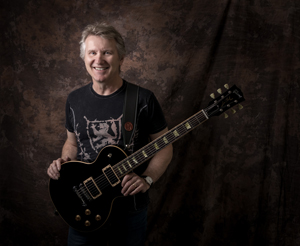 As you said, yeah, sometimes Iím sitting down and noodling with my guitar and writing some lyrics in my notebook, and one thing will lead to another, and before I know it, the thing has taken a shape and a form and a style. I donít sit down and think, okay, I need a song that goes with spandex pants. [Laughs] Even though TRIUPMH did that, and that was a part of what the record companies were saying they wanted. Arena rock. Even when I left TRIUMPH, there was that pressure. That influence coming back from managers or record companies, and theyíre going, ďCome on now Rik, you got to get your leather jacket on and have your Les Paul on the cover of the album.Ē Itís like, okay, Iím going to do that, but Iím going to transition guys. Slowly but surely, Iím going to work my way back to being a singer/songwriter. Thatís the kind of thing I can keep on doing for decades. If you lock me into this arena rock, like the guy on MTV with the hair thatís cut like Farrah Fawcettís, Iím going to be pigeon-holed, Iím going to be trapped. I really donít want to be trapped. Iíd like to keep doing this for the long haul. Thatís just how I operate.
As you said, yeah, sometimes Iím sitting down and noodling with my guitar and writing some lyrics in my notebook, and one thing will lead to another, and before I know it, the thing has taken a shape and a form and a style. I donít sit down and think, okay, I need a song that goes with spandex pants. [Laughs] Even though TRIUPMH did that, and that was a part of what the record companies were saying they wanted. Arena rock. Even when I left TRIUMPH, there was that pressure. That influence coming back from managers or record companies, and theyíre going, ďCome on now Rik, you got to get your leather jacket on and have your Les Paul on the cover of the album.Ē Itís like, okay, Iím going to do that, but Iím going to transition guys. Slowly but surely, Iím going to work my way back to being a singer/songwriter. Thatís the kind of thing I can keep on doing for decades. If you lock me into this arena rock, like the guy on MTV with the hair thatís cut like Farrah Fawcettís, Iím going to be pigeon-holed, Iím going to be trapped. I really donít want to be trapped. Iíd like to keep doing this for the long haul. Thatís just how I operate.
KNAC.COM: Your latest is Folk Songs For The Farewell Bonfire (The Bonfire Sessions), comprised of 18 solo acoustic/vocal tracks, as well as six jazz guitar instrumentals. I understand that youíre doing them in groups of six, so far thereís 18, but are you shooting for 24? Tell me about that.
EMMETT: Theyíre all done. They were all done at once. Then it is just a question of how we manage the retailing of these off the website. Part of that was also Steve Skingley was the engineer that helped me record it and he was mixing them, and 24 is a lot to do. Letís just do it in six-packs. We started out with vocal/guitar tunes, and there were 18 of those, and theyíre all out now and theyíre available. We saved the last group of jazz guitar pieces as the last group of six, and the instrumentals. Eventually there will be 24. The last guy I interviewed with asked me what I had on my bucket list. When I did Folk Songs For The Farewell Bonfire I was thinking that might be my last kind of kick at the can, but itís going well and Iíve been doing a lot of interviews now because of the Round Hill release, so it seems like I could do it again? [Laughing] Being I only have to go down to the basement. I think on my bucket list, is just this thing that says, ďKeep doing more of the same.Ē
KNAC.COM: I like that bucket list. I noticed something. You have a rock project called RES 9 - by Rik Emmett and RESolution 9. You had ReCOVERy Room 9 as well. What is the correlation with the number 9?
EMMETT: Okay, so 3 of the albums that Round Hill has re-released I did with a guy named Dave Dunlop. Dave and I toured together. Heís kind of like my guitar accompanist, ass kicking, buddy.
KNAC.COM: STRUNG-OUT TROUBADOURS?
EMMETT: Yes. Dave had been in a rock band before called FULL NINE, and when Dave plays weekend hockey, he wears number 9 on his jersey and heís got this thing about 9. So his studio is called Room 9. So when we were doing cover songs, we thought it was a clever title to be ReCOVERy Room 9. So 9 is also a magic number in the chinese culture. They see it as a very magic number. It means very little to me, but when we were trying to come up with a clever name for the band, Dave was in it, Steve Skingley (bass) and Paul DeLong on drums and the record company was giving me this deal, I wanted to make a real band record. So we had to have pre-production, the tracks have got to get cut like itís a real band, so we needed a name for it. 9 was on the table because of Dave, my initials are RE, and the band became sort of my solution to the problem of delivering on these contracts, so it became RESolution, and then we gave it the number 9 because of Dave.
KNAC.COM: Okay, that is clever. Thatís a good story. You delivered your contract.
EMMETT: Yeah, Iíve been in the business long enough that sometimes youíve got to do some things, so you create a good backstory.
KNAC.COM: Way better than just saying you just went into your basement.
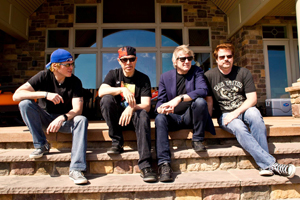 EMMETT: Iím going to have to make my basement into a sadomasochistic dungeon. [Laughs]
EMMETT: Iím going to have to make my basement into a sadomasochistic dungeon. [Laughs]
KNAC.COM: Careful with that. That would be an entirely different interview. [Laughing]
EMMETT: Weíll put pictures on the internet. Itíll be like that guy, did you ever see the show Billions? Thereís a guy on there that plays a district attorney and his secret life is that he goes into his dungeon with his wife. Okay, maybe not. [Laughing]
KNAC.COM: It could be really great for publicity though? REboots 9? You might be onto a whole new creative idea there. [Laughs] So, I interviewed Mike Levine way back in 2008. He spoke of the long silence between you, him, and Gil (Moore). He said that your brother had a big part in getting you to reunite before his passing. Do you still keep in touch with Mike and Gil?
EMMETT: Oh yeah! Obviously Banger Films is putting out a documentary on the band coming out in the fall. We actually got together and rehearsed and we played 3-songs for a group of fans that they flew in from all over the world last November. They filmed it and that will be in the documentary. Oh yeah. I still talk to them and we send emails. Every year at Christmas we get together and we have dinner and have a few drinks. We tell old war stories and have fun. You know, I lost my brother to cancer. Iíve actually lost two brothers to cancer. The one that was the motivator for getting the TRIUMPH reunion, he was such a huge fan of the band. You know, when you get into the last stage, he was at Stage 4, and you know that the end is coming, thereís a whole thing of trying to take care of business. Unload the baggage. My brother turned it around on me and said, ď You know you have to do this.Ē I thought, oh man, oh geez, maybe I do. So I did. I lost my brother, but I got two of my brothers back. It was a good thing. It worked out to the best for everyone. Iím always going to be grateful to my brother for motivating that.
KNAC.COM: Well, this is the first interview Iíve ever cried with. I understand you do not tour now. I know that Mike at the time had said that it would be tough for TRIUMPH to make a return these days because after three songs, youíd all be done, or fall off the stage.
EMMETT: I think that the general population is starting to get a better understanding of this, but itís especially hard for drummers. In TRIUMPHís case, Gil was also the singer of half the stuff. So drummers that are also lead vocalists, itís really a tough ask if theyíre in their 60ís or early 70ís to be trying to do it. It was a hard gig when you were in your 30s. So, I think Gil has pretty much decided heís hung it up. I think if he did decide to play again, heíd start having problems with his back and his elbows. Heís the kind of guy that would much rather go play golf, and get an injury from playing golf.
KNAC.COM: Itís interesting as you get older. I went to lunch with friends a while back, and the conversations have changed so much through the years. Like dating issues, to kid issues, to empty nest to what pains everyone is experiencing. [Laughs]
EMMETT: Oh! What medication are you taking for that? Yeah, Iíve got to talk to my doctor about that. [Laughs]
KNAC.COM: Would you consider yourself a guitarist or vocalist first, or equally both?
EMMETT: Well, good question. The place where I started was when I was 7-years-old, my mom would drag me off to choir practice at the church. I was a boy soprano, first soprano at 7. My first connection to music really was with singing. Thatís what led me into music. Itís what made me understand that you have to make a physical connection to music. Your whole body is incorporated into the making of music. So then I got a guitar when I was 9 or 10, and now I started to learn some stuff. Iím pretty good at guitar because Iím left handed. When I play it the way right handed guys do, my strong hand is on the board and Iím getting results long before my right handed friends are. Iím going, ĎHey, Iím pretty good at this.í Iím getting positive feedback. So the guitar is now leading me, but whatís the first thing it leads me to do is to sit down and write a song. I learn a couple of chords, I write a tune, I sing it for my mom, and she goes, ďRikki, youíre amazing. Youíre a genius.Ē So, Iím getting positive feedback on a couple of levels. We canít even flash forward because itís too long. In a looong, looong edited sequence of a documentary, we get to 67, and what leads me now, Iím pretty sure, is the writing. I would say that Iím a writer more than I am anything else. I just finished a book of poetry. Thereís a publisher that wants a memoir. I think Iím going to tackle that myself. I think I wrote the guitar columns for 13-years. I think Iím a writer. The whole musician thing is sort of sublimated to the idea of, if you write it, then itíll be very real when you play it. Itís kind of like when people are singing their own songs, theyíre going to be able to make it very real for an audience. No one is ever going to say Bob Dylan can sing just like Steve Perry. No one is ever going to say that. When Dylan sings his own tunes, people go, ďThis is extremely real.Ē Thereís something extremely valuable about this. Steve Perry was one of my favorite singers, I love the sound of his voice. Dylan is so valuable because heís such a great writer. Thereís a depth and substance when you sing your own tunes.
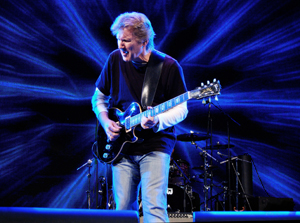 KNAC.COM: I completely agree with you on that. On your website, people can find a calendar you collaborated with photographs by Jeanine Leach that feature your poems and lyrics.http://www.rikemmett.com/photo-escape-calendar/. You once worked with a friend of mine, Ron Nevison. I never realized that TRIUMPH worked with him. So much of what he did, with the exception, sorry, of HEART during that time, I loved. Have you two spoken?
KNAC.COM: I completely agree with you on that. On your website, people can find a calendar you collaborated with photographs by Jeanine Leach that feature your poems and lyrics.http://www.rikemmett.com/photo-escape-calendar/. You once worked with a friend of mine, Ron Nevison. I never realized that TRIUMPH worked with him. So much of what he did, with the exception, sorry, of HEART during that time, I loved. Have you two spoken?
EMMETT: No. It ended poorly with Ron. He never made it through to the end of the album. He was on the pre-production for The Sport of Kings and on the bedtracks for that album. 1987-ish. This will be covered in the documentary. Ron had his way of working. He wanted to turn TRIUMPH into a band where I would be the singer of everything. Gil Moore was going to be cut out of being a vocalist for all the material. That was just never going to fly with the politics of the band. Ron misread the politics of how the band was managed. When he decided he was going to lay down the Ron Nevison law, that didnít work out. His second in command was Mike Clink. Mike Clink took over and finished our record and then went on to do Appetite for Destruction by GUNS Ní ROSES. [Laughs] He went onto some large scale things that made him a superstar. That worked out pretty good for everybody. Iím sure Ron went onto other things too. It was all good in the end.
KNAC.COM: Well, Ron gets a kick in the shin for that one next time I see him.
EMMETT: Well, I donít think heís still the same kind of guy. The Ron we met just came off the resurrection of HEART and JEFFERSON STARSHIP. He was driving the Bentley and living the good life. Yeah. You know. I mean, I broke up with TRIUMPH and didnít talk to them for a couple of decades and I made up with them. Iím sure I could probably get along with Ron and sit down and have a drink with him and it would be fine. Tell him I said hello!
KNAC.COM: I do want to ask you about the documentary. With this pandemic, will the release be delayed?
EMMETT: No. I think theyíre going to release it in the fall no matter what. I think it becomes a question of how. They were going to do it at the Toronto Film Festival, but that isnít going to happen. Theyíre doing that in some sort of digital, safe distancing way. It may just go straight to Netflix or in Canada thereís a service called Crave. Itíll be a streaming kind of thing. The last one they did was ZZ TOP (https://www.imdb.com/title/tt9015306/). I think itíll be the same direction to release ours as theirs. They couldnít release that one into theaters either. Iíve seen the second rough cut, it looks great.
KNAC.COM: Iím excited.
EMMETT: Banger knows what theyíre doing. Theyíve done, oh my God, RUSH, IRON MAIDEN, METALLICA.
KNAC.COM: ZZ TOP was such a beautifully filmed documentary. One of my favorites to date. Will they have any of the US Festival in this?
EMMETT: Thereís going to be everything in there. Itís kind of a surreal, ĎThis is your Lifeí kind of thing. They go right back to the bands we were in before we were in TRIUMPH. They found cuts on 2-inch 24 track tape that we never released, and they have some of that in the documentary. Of course, the performance we did for the fan-fest and the 3-songs we did. I think the biggest challenge at this point is how can they cut it down from 7-hours. [Laughs]
KNAC.COM: Iíd like to see all 7 of those hours. I was at the US Festival. Iím not sure if you remember me? I was the blonde girl in like the 5th row, or something like that. [Laughing]
EMMETT: Well, Iím sorry. You know, that gig was weird because there were all these cameras and the stage was so huge, and the photo pit was so huge and the barricade was so far away, and of course a sea of people as far as your eye could see. It was nuts. You might be in the footage though. I mean there were girls dancing around in their bikinis and on their boyfriendís shoulders. Were you one of those?
KNAC.COM: I might have been. It might not have even been a boyfriend, who knows? It was the 80ís. [Laughing] I was very young at the time.
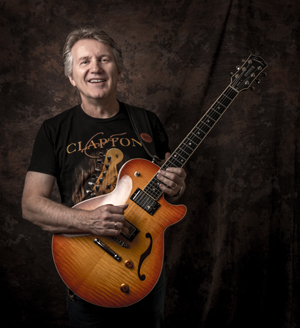 EMMETT: Yeah, werenít we all.
EMMETT: Yeah, werenít we all.
KNAC.COM: I read on your bio that a music magazine once said Rik is his own worst enemy, one of the only guitarists out there who may be too talented for his own damn good. What does that mean to you?
EMMETT: Itís kind of a half compliment, half slap in the face. Iíll take it as a compliment. I think itís probably fairly accurate in the sense that, because I was this guy that sang and wrote and played guitar. I had this sort of triple threat thing going on, but I was never going to be comfortable living in one bag, you know? I think thatís what heís talking about. Heís saying, if he doesnít commit himself to one kind of haircut and one type of shoes, then heís never going to be mainstream or be in a multi-platinum kind of way. I was uncomfortable with that. I write jazz guitar pieces and I write poetry books. I mean, come on! Jazz is like 1% of the marketplace. I know what Iím getting myself into.
KNAC.COM: I mean, I guess you could do the other 1%, which is childrenís music. [Laughs]
EMMETT: Give me time, I might go there.
KNAC.COM: Okay, in closing, I have to nerd out a minute with you here. My husband was so excited I was interviewing you. He had to show me pictures of you playing a Flying-V and a double-necked guitar, and told me every guitar player at the time was in awe over these guitars. Maybe an Ibanez? Do you have a favorite?
EMMETT: Youíre right. It was an Ibanez Double-Neck. That was a great guitar, but it weighed a lot. Iím paying for it now with the discs in my neck and back. Now I just like really light guitars. The lighter they are, the more I like them. I have a nice collection. I have Fender Telecasters and Gibson Les Pauls. Thereís a guitar I use for most of my gigs, which is an acoustic/electric, Canadian, Godin A-6. Thatís kind of my number one right now.
KNAC.COM: Well Rik, thank you so much for talking with me today. Really looking forward to the documentary and wishing you many more years of continued successes with creativity.




